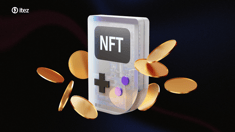Altcoins, which encompass all cryptocurrencies developed after Bitcoin, arose in response to BTC limited technical capabilities. While Bitcoin’s smart contracts are only capable of enforcing spending limits, Ethereum’s smart contracts can execute a wide range of tasks, including launching decentralized exchanges.
Recognising this gap, developer Robin Linus has put his own thoughts into a scheme that can increase BTC’s capabilities, called BitVM. Let’s learn more about the proposal and why the crypto community named BitVM an “altcoin killer”.
What is BitVM
BitVM (Bitcoin virtual machine) is a proposal designed to increase Bitcoin's functionality. It was written by ZeroSync co-creator Robin Linus. On October 9, 2023, he published a white paper called “BitVM: Compute Anything on Bitcoin,” and the crypto community immediately started discussion regarding BitVM’s potential.
BitVM's goal is to expand Bitcoin’s smart contract capabilities. Technically, it is possible to build primitive smart contracts on the BTC network, but Ethereum offers considerably more sophistication.
Smart contracts are algorithms that automate the execution of a wide range of tasks and help building new projects on the blockchain. They can be compared with the signed deal, which controls every step of the conclusion. When all requirements are met, smart contracts automatically execute what is supposed to be executed. For example, money transfers after a buyer makes a purchase or salary disbursement.
Bitcoin’s smart contracts are akin to basic calculators, whereas Ethereum’s are linked to advanced smartphones. ETH’s smart contracts can be used to construct exchanges or lending platforms. Bitcoin's are only capable of dealing with simple requirements, such as spending limits or operation approval.
BitVM aims to expand Bitcoin’s smart contract functionality and provide the network with the opportunity to interact with other blockchain networks. This means that users can transfer assets across different networks, a feature already present in various altcoins. This innovation could significantly bolster Bitcoin's competitive edge.
BitVM proposal technical details
BitVM introduces this advanced functionality without the forks that developers usually employ to change protocols or launch new blockchains.
Instead, Linus proposes conducting off-chain calculations beyond the main net, which is similar to L2 and L3 commonly used in other crypto projects.
Off-chain calculations, while less effective than L2 and L3 solutions, still meet the requirements to increase BTC’s functionality. They can manage the mainnet calculations, while the mainnet itself is going to be used only to fix the results of completed operations. This approach ensures that the Bitcoin mainnet remains unburdened by excessive computational demands.
Learn more about blockchain layers in our Polygon review, which is an L2 solution, built in order to increase Ethereum functionality.
Why people call BitVM “altcoin killer”
Altcoins are Bitcoin’s alternatives. They became popular because of their new technical solutions. For example, Ethereum revealed modern smart contracts, providing a foundation for various crypto projects. Some developers used Ethereum to build their own blockchains, kickstarting the altcoin market. If Bitcoin was capable of offering similar solutions, Ethereum would probably never exist.
BitVM pushes Bitcoin closer to Ethereum’s parameters. It may be assumed that Linus discovered a way that makes all altcoins useless. With this proposal, Bitcoin's time-tested blockchain can accommodate the development of new projects, eliminating the need for alternatives.
BitVM crypto community reviews
There are many different opinions about BitVM. Preston Pysh, an author, podcaster, and investor, believes that Linus’s proposal is unique.
“He basically discovered virtual silicon in the bitcoin blockchain… enabling logic gates, computation, and thus smart contracting… without any fork to the existing code", Pysh noted.
In contrast, Bob Bodily, CEO of Ordinals-based platform Bioniq, disagrees with Pysh. He thinks that BitVM should not be considered a universal key that answers Bitcoin’s functionality limitations. Bodily asserts that Ethereum provides superior, faster, and more cost-effective solutions. Therefore, he advises against labelling BitVM as an altcoin killer.
Can Bitcoin destroy altcoins now
As it stands, BitVM is now nothing more than just a proposal. Following its publishing, the community started discussions about conducting a demo that requires new rules. Some market participants shared their first test results.
One tester, Bob Bodily, contends that BitVM cannot be compared with second-layer protocols — add-ons on top of the cryptocurrency network that take over most of the calculations. Instead, BitMV is more similar to a peer-to-peer protocol, which means Bitcoin is unlikely to come close to Ethereum in terms of technology. However, Bodily believes it will facilitate the development of a network of second-layer protocols. This network will accelerate transaction processing and expand Bitcoin's capabilities.
The effectiveness of BitVM has yet to be verified by the Bitcoin Foundation, responsible for Bitcoin’s ecosystem development. Successful tests could lead to a community vote to implement the proposed rules. Node operators, responsible for validating transactions within the cryptocurrency network, will have the final say through their votes. If the majority agrees, the new rules will come into force.
🤔 What's your opinion on BitVM? Share on our socials!
💌 Telegram, Twitter, Instagram, Facebook
👀 Interesting articles:
Buy Bitcoin with your credit or debit bank card
Anticipation of Bitcoin spot ETF approval in the US
Fake news on spot Bitcoin ETF approval pumped BTC to $30,000
This article is not an investment recommendation. The financial transactions mentioned in the article are not a guide to action. Itez is not responsible for possible risks. The user should independently conduct an analysis on the basis of which it will be possible to draw conclusions and make decisions about making any operations with cryptocurrency.








